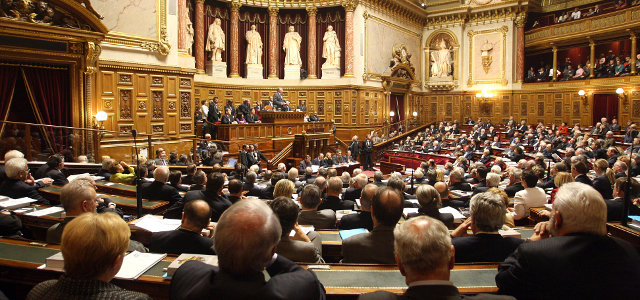Yesterday, the French senate passed its amended draft of a French energy transition law. Kathrin Glastra takes an in-depth look at the outcome.

The senate abandoned energy consumption reduction plans of 20% by 2030. (Photo by Sénat Sénat, CC BY-NC-ND 2.0)
Re-nuclearised? Unacceptable? Or rather progressive, as others say? The opinions on the French senate’s vote from March 3 may differ, but the outcome in itself is clear: 182 senators (mainly from the conservative UMP) voted in favour of the heavily amended energy transition law proposal, while the Socialist Party abstained and the Greens rejected it.
With this vote, the national energy transition law („projet de loi sur la transition énergétique pour la croissance verte“) has reached almost its final round. To recap: the parliamentarians in the French General Assembly (with a socialist majority) discussed and adopted the law proposal last autumn and passed it on to a politically adverse senate. The senate and its commissions now discussed approximately 1000 amendments to the law and introduced with their vote some fundamental, game-changing elements to it. Not that the original proposal of Environment Minister Ségolène Royal was overly ambitious, but it was generally seen as moving into a more sustainable direction.
Particularly disappointing, but not totally unexpected, the senate changed a short, but significant point concerning the reduction of the share of nuclear power generation from currently 75% to 50%: instead of sticking with the target date of 2025, they replaced it by “à terme”, meaning: to be deferred to forever and a day. And to make matters worse, this objective shall only be pursued if in line with France’s energy independence objectives and competitive electricity prices.
The senate’s amendmends would dismantle the original proposal of Ségolène Royal and fail to live up to President Hollande’s campaign promise to reduce France’s nuclear share with a total cap of 63,2 GW. If the new EPR reactor in Flamanville were to be connected to the grid (as planned despite big delays), another one would have to be closed, the original proposal read. However, it is likely – as recently confirmed in a letter of Minster Royal to German Environment Minister Hendricks (in German) – that this would be Fessenheim, on the border to Germany. The French Greens welcomed the recent announcement but underlined the need for a binding calendar of the shut-down. Now the senate would like to see the opening of Flamanville while keeping Fessenheim online.
Furthermore, the senate abandoned energy consumption reduction plans of 20% by 2030, which makes it harder to achieve the foreseen 50% reduction in 2050!
To be fair, not all is bad: some of the senate proposals facilitate the financing of energy cooperatives and make grid access for renewables compulsory within 18 months – this goes beyond the original proposal. But the senate makes it more difficult by increasing the distance between renewable installations and residential areas and by reintroducing the obligation to create special zones for wind parks. It remains to be seen how these discussions develop over the next weeks and months and which provisions will strengthen community renewable power projects.
What’s next? Rumour has it that Ségolène Royal favours any law adoption as long as it is decided before the climate conference (COP) in Paris in December. In the light of the French COP presidency, the discussions around the European Energy Union and regional elections in March (which might lead to just another reshuffle of the cabinet), the French national government clearly has other concerns, not to forget the recent rise of the Front National in the polls. So the interparliamentary conciliation group, consisting of 7 senators and 7 parliamentarians, will now have to find a common ground on March 10 – or risk that the law gets passed back to the General Assembly and the senate. The French Socialist Party has already declared that the senate’s proposal is “unacceptable”, so not all hope for a meaningful French energy transition law is lost just yet.
Kathrin Glastra is a program coordinator in the Brussels office of the Heinrich Boell Foundation. She is responsible for the foundation’s network Energytransition@EU which focuses on creating an inclusive European energy transition debate.
Please note that you can find the key findings and a full translation of our book “German Energy Transition” in French here.